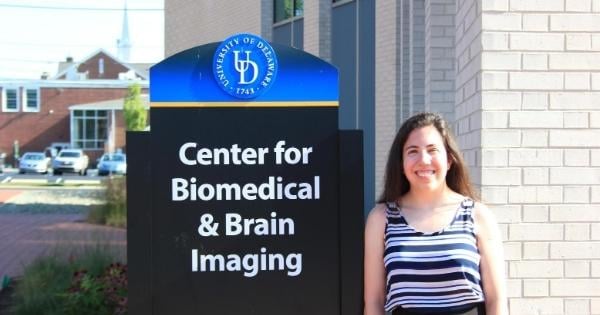
As a biomedical engineer, Ariel Hannum’s foremost mission has always been to make a positive impact on the lives of others. Having recently graduated from her honors program at the University of Delaware, Hannum, CE20, has dedicated most of her time as an undergraduate to contributing to healthcare innovations in imaging technology.
The field of medical imaging first captured Hannum’s fascination during a summer internship for a medical technology company where she was exposed to the various applications of magnetic resonance imaging (MRI) as a tool to detect and diagnose disease in the human body.
“I was drawn to how imaging technology can help identify and diagnose disease, which can have a significant impact on patient outcomes,” Hannum said. “I wanted to be part of developing innovative medical imaging techniques.”
Returning to campus in the fall, Hannum was excited to further explore medical imaging applications, eventually pursuing a research opportunity in a biomedical engineering (BME) lab with Dr. Curtis Johnson.
Hannum’s primary interest was in utilizing an MRI technique called Magnetic Resonance Elastography (MRE) to calculate mechanical properties of brain tissue to better detect and diagnose brain disease. Her project soon evolved to focus on ways to improve MRE to produce higher quality images, such as in limiting signal noise.
“I am part of the improvement of an analytic tool that can really improve patient outcomes by providing early and accurate diagnosis,” Hannum said. “It is very exciting to contribute to changing people’s lives.”
Hannum also continued to cultivate her interests through her coursework. For her Senior Design project, she was challenged to work on a medical device that needed to fit within the MR environment.
Hannum proceeded to study how an Oscillatory Lower Body Negative Pressure (OLBNP) device – an MR-safe, lower body, negative pressure chamber – could grant the ability to simultaneously assess arterial and brain stiffness and assist in understanding the relationship between these two values in regards to brain aging.
As people age, arteries become stiffer while brain stiffness decreases, Hannum described. This response changes and is accelerated in diseases such as cognitive impairments.
“While negative pressure chambers exist, there are limitations including sizing restrictions, non-ferrous metal parts, and ease of patient movement,” Hannum said. “I wanted to be part of solving this problem.”
When negative pressure is applied to the lower portion of the body, autoregulation in blood flow takes place to accommodate for the change of atmospheric pressure, and the reaction is able to be plotted.
“We are also unsure how these responses alter the brain’s mechanical properties,” Hannum said. “Understanding how the brain functions will help researchers better evaluate, treat, and prevent cognitive impairment disorders.”
The development process for the device involved multiple early prototypes and comprehensive planning between Hannum and the other BME students in her Senior Design team. They utilized on-campus resources and workspaces; consulted with faculty across the engineering departments; assessed strengths and weaknesses among team members; and assigned tasks and set objectives.
“When working on a challenging problem, it is best to divide it into parts, recognize the resources that you have available and understand how to maximize these resources,” Hannum said. “In research, I discovered the value of thoughtful trial and error in developing experiments Additionally, I think it is important to reach out and talk to people about your ideas and receive feedback. It challenges you to put your own ideas out there and receive constructive opinions.”
Hannum’s Senior Design project has since been delivered to her group’s sponsor, the UD Neurovascular Aging Laboratory. They plan on utilizing the device in studies with individuals outside and inside the MRI, first seeking to obtain institutional review board approval for a pilot study in 2020.
“I am really proud of what my group accomplished,” Hannum said. “My experiences in both design and research reaffirm my interests in continuing to work within the MRI field.”
As an entrepreneurial studies minor, Hannum was also able to marry her research interests with her entrepreneurial pursuits in the Delaware Innovation Fellows program, where she was selected to participate as part of a first cohort of 40 students.
“I have loved how DIF broadened my entrepreneurial mindset,” Hannum said. “DIF was my door for learning about other innovation-related opportunities offered by Horn Entrepreneurship. DIF has demonstrated to me different ways to approach problems and the importance of really understanding the problem prior to developing solutions.”
Hannum also reflected on the opportunities outside of research which DIF helped to bring to her undergraduate experience.
“Without DIF, I would never have taken entrepreneurship classes to receive a minor in entrepreneurial studies, studied abroad in Barcelona, been selected as a University Innovation Fellow, and been a Horn Ambassador,” Hannum said. “I am grateful for DIF for enriching my UD experience.”
Having recently graduated from UD this past spring, Hannum will be continuing her studies at Stanford University where she intends to pursue a PhD in bioengineering and continue to conduct MRI research.
“I am eager to continue to develop my foundation in MRI and be a part of improving MRI techniques,” Hannum said. “I also have grown and discovered new passions in ways that I never expected. I am extremely grateful for the many undergraduate opportunities at UD.”
About Horn Entrepreneurship
Horn Entrepreneurship serves as the creative engine for entrepreneurship education and advancement at the University of Delaware. Currently ranked among the best entrepreneurship programs in the US, Horn Entrepreneurship was built and is actively supported by successful entrepreneurs, empowering aspiring innovators as they pursue new ideas for a better world.

